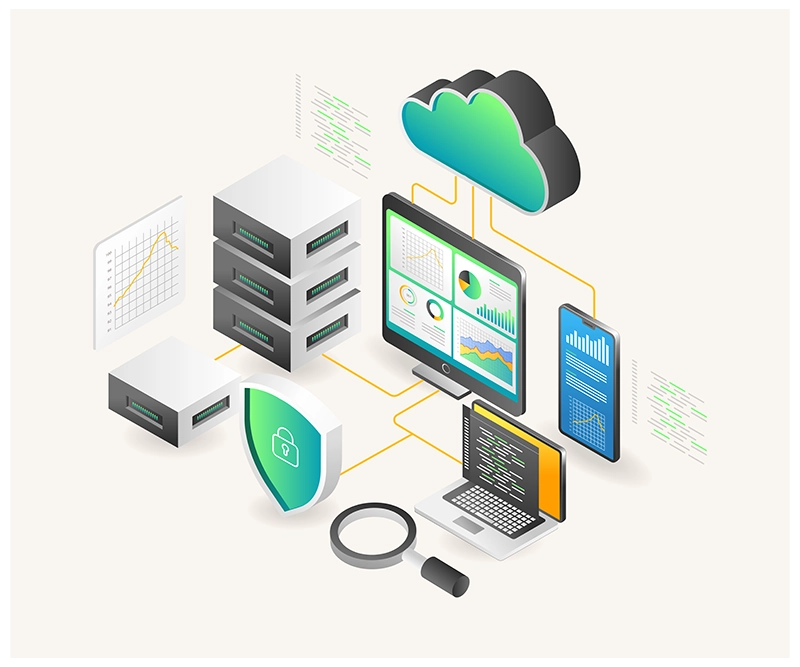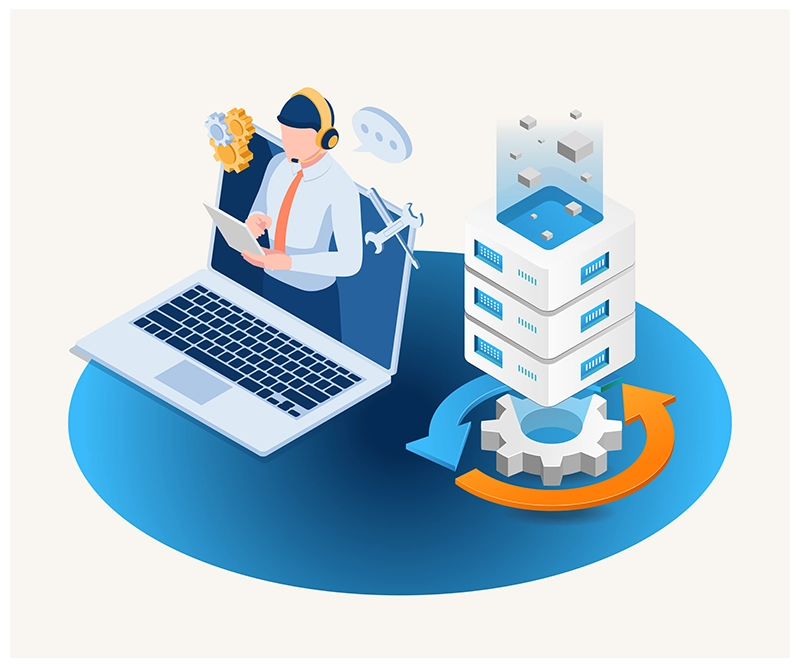Managing an IT infrastructure is often complex and resource-intensive, especially for small to mid-sized businesses (SMBs) struggling to access larger budgets or high-level expertise.
This is why Managed IT Services are so critical to business success.
Let’s define Managed IT Services in context and explore how these services can best benefit SMBs and boost operational efficiency. We’ll also consider the advantages of choosing a Managed Service Provider (MSP) and how to select the right MSP for your business.
What are Managed IT Services?
Managed IT Services are a practice in which IT tasks and functions are outsourced to a third-party provider, known as a Managed Service Provider (MSP).
Available IT services include a wide range of capabilities:
- System Oversight. The MSP handles the technology so business leaders and employees can remain focused on their work.
- 24/7 Remote and Onsite Support. When tech issues inevitably arise, members of a company team can reach out to the MSP for 24/7/365 IT assistance.
- Proactive Services. Reliable backups, server monitoring, event logging, and more ensure systems are always up and running when businesses need them.
- Powerful Security. Comprehensive cybersecurity identifies and eliminates threats and prevents breaches so employees and leaders can relax and remain on track toward business goals.
When the MSP takes on the responsibility of monitoring, maintaining, and enhancing IT infrastructure, the business can focus on core operations instead of peripheral technologies.
What are the Benefits of Using Managed IT Services for Small and Medium-Sized Businesses?
Cost Savings
One of the most significant advantages of Managed IT Services for small to mid-sized businesses (SMBs) is cost savings. By outsourcing IT management to an MSP, businesses can avoid the substantial expenses associated with hiring and training an in-house IT team. Because many MSP service providers offer flexible pricing models like monthly subscriptions, businesses can more effectively manage their IT budgets.
Access to Expertise
Managed IT Services give SMBs invaluable access to skilled IT professionals who have expertise in a wide range of IT specialties and functions. With MSPs tuned into the latest industry technologies and best practices, businesses can quickly benefit from niche insights and cutting-edge solutions without wasting time on research, trial, and error.
Enhanced Security
Cybersecurity threats such as malware, ransomware, phishing, business email compromise (BEC), fraud, and cyber intrusion are a perennial concern for businesses of any size. That’s why MSPs implement specialized and robust security measures including proactive monitoring, threat detection and response, and regular assessments to protect company data, systems, and information.
Per recent research, reported Help Net Security, 94% of SMBs (nearly every business surveyed) have experienced at least one cyberattack. The statistic is striking compared to 2019, when only 64% of businesses had undergone a prior violation.
To avoid becoming just another statistic, businesses can partner with an MSP to safeguard against cybercrime, reduce the risk of data breaches, and create extensive recovery plans if attacks occur.
Scalability
As businesses grow, so do their IT needs. Since managed IT services are scalable, companies can adjust IT resources to align with shifting requirements or processes. From infrastructure expansion to new platform integration or downscaling to meet lower demand, MSPs provide the flexibility and efficiency needed as a business evolves.
Improved Uptime and Reliability
Downtime leads to lost productivity and revenue, which can become costly for businesses. MSPs use proactive monitoring and maintenance to identify and address potential issues before they could disrupt workflow.
Providers also equip businesses with access to proactive consultation sessions regarding pioneering tech solutions, substantial knowledge and experiential base, tailored IT recommendations, and support toward navigating complex tools or broader industry shifts.
The result: Improved uptime and reliability of IT systems, trusted technical expertise, small business IT support crafted to meet critical priorities, and enhanced operational efficiency.
Why You Need Managed IT Services
Stick to Core Business Functions
Outsourcing IT management means that the core business focus remains on critical tasks and strategic goals. Instead of dealing with technical issues and irritations, leaders and employees can dedicate more time and resources to meaningful and productive business practices that align with the company’s central vision.
Gain Access to Advanced Tools and Technologies

MSP companies invest in top-tier tools and technologies so that they can deliver the highest-quality services to their clients. These tools, which might be cost-prohibitive for individual businesses to purchase and maintain, include advanced monitoring systems, cybersecurity solutions, and data analytics platforms.
By partnering with an MSP, SMBs gain access to these advanced resources without the steep associated costs.
Take a Proactive Approach to IT Management
Rather than waiting for problems, MSPs continuously monitor systems to detect and resolve issues before they impact operations. It’s a key benefit, as a proactive process minimizes downtime, enhances security, and prioritizes consistent optimal system performance.
Develop IT Strategy Roadmaps
MSP service providers work closely with their clients to craft thoughtful IT plans that align with business objectives. Dynamic initiatives may include identifying potential system upgrades, developing processes to enhance existing infrastructures, and considering how to best support future growth. Strategic planning allows businesses to make informed decisions and outpace competitors.
Compliance and Regulatory Support
When it comes to data security and privacy, many industries are subject to stringent regulatory requirements. MSPs have the expertise to guide businesses on how to properly meet industry standards, implement best practices, and comply with regulations—reducing any risk of non-compliance and potential penalties and giving business owners peace of mind.
How to Choose the Right MSP
Assess Your Needs
Audit what your business needs in terms of IT services before selecting any MSP. Do you need network management services? Cybersecurity? Cloud solutions? Understanding what you’re looking for will help you hone in on which providers best fit your business.
Evaluate Experience and Expertise
Look into the history of your MSP, particularly in managing IT services for businesses similar to yours. Choose a provider with a proven track record, positive client testimonials, and industry-specific experience. You want a team well-equipped to deliver tailored solutions to your company’s unique challenges.
Review Service Level Agreements (SLAs)
Service Level Agreements (SLAs) outline the scope of services, performance metrics, and response times guaranteed by the MSP. Carefully review these agreements to ensure they align with the needs and expectations of your business. Pay attention to important factors like uptime guarantees, responsiveness, and accessible support.
Consider Scalability
Your business’s IT needs may change over time, so it’s crucial to choose a provider that can scale its services accordingly. Discuss potential growth scenarios with your MSP to ensure they have the flexibility to accommodate evolving requirements. You want a scalable MSP that can support your business as it expands and adapts.
Assess Security Measures
Security is a top priority for any business and your MSP should have robust security measures in place. Be sure to ask about cybersecurity protocols, threat detection systems, and incident response plans. A reliable MSP will explain how they prioritize data protection and call on best practices to safeguard sensitive information.
Gauge Communication and Support Plans
Strong communication is essential to any successful partnership. When choosing your MSP, evaluate their availability, accessibility, and support strategies. The most successful providers typically offer 24/7 small business IT support and maintain clear lines of communication so problems can be promptly handled.
Request References and Case Studies
Ask potential MSPs for references and case studies from recent or current clients. Feedback and insights into the provider’s reliability and results will support you to make an informed decision.
How Managed IT Services Can Improve Operational Efficiency
Streamlined IT Operations

Managed IT Services simplify IT operations by centralizing management and support functions. By employing advanced tools that monitor and manage IT infrastructure, MSPs consolidate the complex process of maintaining multiple systems—leading to more efficient workflow and streamlined solutions.
Proactive Maintenance
One of the hallmarks of managed services IT support is proactive maintenance. MSPs perform regular system checks, scan for updates, and optimize existing functions to identify and prevent potential issues. This take-charge approach minimizes downtime, improves system performance, and extends the lifespan of IT assets.
Reduced Downtime
Downtime affects productivity and revenue for your business. MSPs employ proactive monitoring and maintenance to identify and address problems before they escalate, a process that results in reduced downtime and fewer operational disruptions.
Enhanced Collaboration
MSPs facilitate stronger collaboration with the use and maintenance of tech-based communication platforms. Whether setting up secure email systems, managing cloud-based collaboration systems, or ensuring immaculate connectivity, MSPs help businesses achieve both internal and external communication goals.
Optimized Resource Allocation
Instead of allocating internal resources to IT tasks, businesses that outsource IT management to MSPs can focus only on the core processes that drive success, growth, and innovation. It’s an efficient decision that can lead to significant increases in productivity—and profitability.
Access to Latest Technologies
From cloud computing to artificial intelligence, MSPs help businesses learn about, access, and leverage new technologies and industry trends, from cloud computing to artificial intelligence, that can enhance operations and provide a competitive edge.
Improved Decision Making
Managed IT Services provide businesses with valuable analytics by using cutting-edge and advanced tools to collect data, synthesize key information, and offer actionable insights to inform strategy. A data-driven approach is crucial for businesses working to identify potential opportunities, streamline existing processes, and improve outcomes.
Compliance and Risk Management
MSPs support businesses by ensuring that all IT systems comply with critical industry regulations and standards. Providers implement robust security measures and conduct regular audits to identify and mitigate any risks, like data breaches or regulatory concerns.
Disaster Recovery and Business Continuity
MSPs implement comprehensive disaster recovery and business continuity plans to safeguard against potential unforeseen damage. By ensuring regular data backups and rapid restoration solutions, MSPs prepare in advance on how to minimize downtime and keep business operations running smoothly even amid an unexpected adverse event.
Final Thoughts
Managed IT Services offer many benefits for small to mid-sized businesses, from cost savings and enhanced security to improved operational efficiency and access to advanced tools and specific system expertise.
Outsourcing IT management to a trusted MSP company means that businesses are free to focus on their core functions, look toward longer-term goals and innovative projects, and ensure compliance and security.
To choose a provider, assess key business needs, evaluate past experience and current expertise, review SLAs, and discuss scalability methods and security measures. The right managed IT provider partner enables businesses to become more productive, reliable, and successful, positioning themselves for future growth and strategic advancement.


